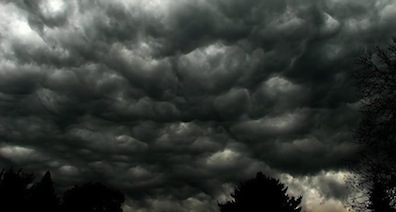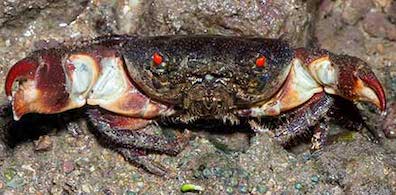In chapter 17 of 1
Kings, the prophet Elijah announces a drought whose effects will
punish the wicked king Ahab. In chapter 18, after years of
famine, God calls off the terrible drought and sends rain.
Elijah summons his servant to look toward the sea and the
servant (after six unsuccessful tries) tells him, "there ariseth
a little cloud out of the sea,
like a man's hand. And he
[Elijah] said, Go up, say unto Ahab, Prepare thy chariot, and
get thee down, that the rain stop thee not. And it came to pass
in the mean while, that the heaven was black with clouds and
wind, and there was a great rain" (18:44-45). This rain comes as
a sign of divine forgiveness, but for Stephen the omen is not so
favorable. When a violent thunderclap shakes the hospital in
Oxen
of the Sun he cowers in fear, hearing in it God's rebuke
for the drunken blasphemies he has been uttering.
Bloom tries to calm Stephen in that episode, telling him that
the thunder was only a "natural phenomenon." Now, in
Ithaca,
he again advances scientific explanations for Stephen's collapse
in
Circe. Stephen is equally consistent. By blaming his
collapse on a cloud in the morning sky he constructs a
fantastical narrative reaching all the way back to
Telemachus.
The cloud, he infers, swelled with divine menace throughout the
day and came to strike him down. It revisited him first in the
hospital and then in the brothel.
The change of a man's to "
a woman's hand" points to an
important detail in this narrative that critics have never
noticed—the hallucination that immediately precedes his
psychotic break in
Circe. When Stephen, Lynch, Bloom,
Bella, and the three girls are dancing to the strains of
My
Girl's a Yorkshire Girl, his mother returns from the grave
as a halfeaten corpse. This "Lemur," "ghoul," or "Hyena" acts as
the agent of an angry God, demanding that Stephen repent his
intellectual sins: "Beware!
(She raises her blackened
withered right arm slowly towards Stephen's breast with
outstretched fingers.) Beware God's hand! (A
green crab with malignant red eyes sticks deep its
grinning claws in Stephen's heart.)... (Wrings
her hands slowly, moaning desperately.) O Sacred
Heart of Jesus, have mercy on him! Save him from hell, O Divine
Sacred Heart!" A woman's hand—cancerously malignant, piously
accusatory—stabs Stephen in the heart. It is "God's hand!"
As often in Ulysses, to discover the hand's meaning
one must read retrospectively, and the retrospection does not
stop there. It turns out that the cloud too has been
associated with May Dedalus from the beginning. When it blocks
the sun in Telemachus, Dublin Bay becomes shadowed in
"deeper green," and Stephen sees "a bowl of bitter waters"
similar to the china bowl filled with green vomit that stood
beside his mother's deathbed. This reflection leads him to
recall her tearful responses to a song he was singing in a
nearby room, but soon the tenderness turns to horror when he
remembers her ghostly return from death in a dream,
reproaching him for his sins: "Ghoul! Chewer of corpses!" When
May returns as a ghoul in Circe, stretching out her
hand to pierce his heart, the cloud is absent but implicit.
Stephen brings it back in Ithaca: "a matutinal
cloud...at first no bigger than a woman's hand."
Joyce shows both Stephen and Bloom experiencing a small cloud
blotting out the morning sun and feeling their moods darken for
a moment in order to develop his idea of
parallactic
or
stereoscopic
vision—seeing things from slightly different angles. In
Ithaca
it becomes clear just how much difference those two angles
encompass. For Bloom the cloud has presaged a day in which the
weather gods act to relieve Dublin's
drought through a confluence of
atmospheric conditions. For Stephen it has presaged his mother
returning as an agent of the retributive God of Irish
Catholicism, making the day itself rebuke and threaten him. A
little later the chapter asks, "
What two temperaments did
they individually represent?" Answer: "
The scientific.
The artistic."
The passage in 1 Kings occupied Joyce's imagination early
and late. Slote, Mamigonian, and Turner note that it inspired
the title of the Dubliners story "A Little Cloud." The
little cloud returns in Finnegans Wake (157-59) as
Nuvoletta, one of Issy's instantiations. The Italian word
comes from Dante's Inferno, where Elijah's chariot
ascending to Heaven is pictured as a "flame alone / ascending
like a cloud (nuvoletta) into the sky" (26.38-39).
Attentive readers will note that this ascent to heaven is
imitated at the end of Cyclops—and Elijah, of course,
is the prophet who predicts the rainstorm.



